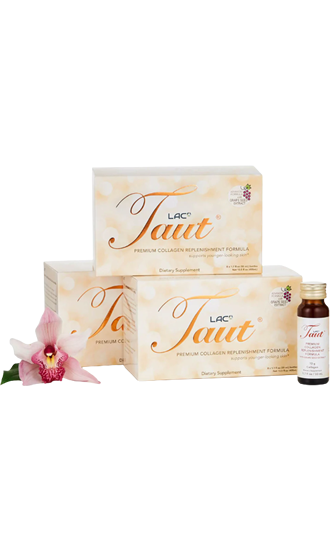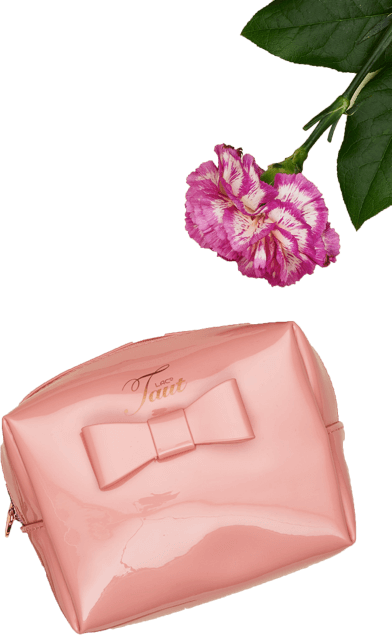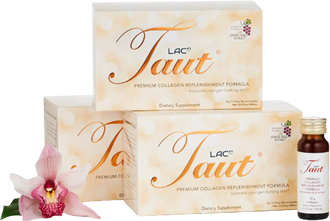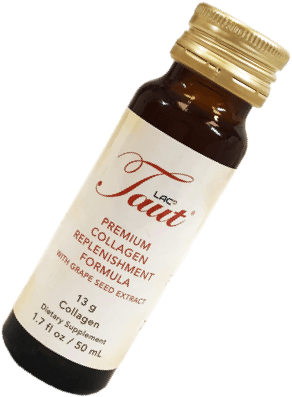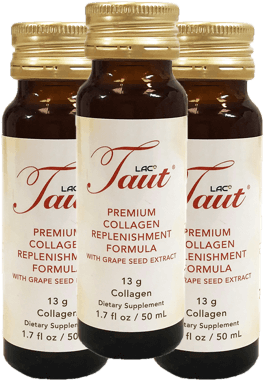Collagen for Face: How to Increase Face Collagen When Losing It

Collagen is the most abundant structural protein in the body, and it's a key component in plump, healthy skin. Although our natural collagen levels decline throughout the face and body over time, it is possible to restore some of that lost collagen to get firmer, more radiant skin.
If you're into skincare, you've probably heard all about collagen already. With celebrity-endorsed brands, social media influencers, and dermatologists all raving about it, collagen facial treatments are more than just a passing skincare fad. If you want to prevent premature aging, reduce the appearance of wrinkles, and achieve a generally healthier, more radiant complexion, you need to get on the collagen-boosting bandwagon.
Unfortunately, because collagen has become such a buzzword in the skincare world, it can be hard to differentiate between treatments that really work and those that use the hype to push products that aren't effective. Not every collagen-boosting treatment or supplement will live up to its potential!
With this guide from RenewSkin Inc., you'll find everything you need to know about getting more skin-loving collagen for your face – including lifestyle changes and foods that won't cost much (if anything), and the best collagen supplements and skincare products that really work.
Why We Need Collagen
Collagen is a natural protein that provides structure, strength, and elasticity to the skin. It can also help improve skin hydration, making it look and feel more supple and radiant. The body produces its own collagen, but it produces less as we get older, and this is a major contributor to skin aging. So if we can increase collagen production in the body, we can help reduce the appearance of fine lines and wrinkles, tighten up loose skin, and even out skin tone on the face.
Besides skin collagen, you'll also find this protein in your joints, bones, teeth, and more. Our bodies need it for a wide range of basic functions, and increasing collagen in your body will provide many health benefits beyond just your skin health. For example, collagen supplementation can also be used to relieve aching joints or to strengthen weak bones.
What Causes Collagen Loss?
Over time, the body's natural production of collagen decreases, leading to a loss of skin elasticity and the formation of wrinkles. There are also a few external factors that contribute to the loss of collagen in the body. Here are the reasons why we lose collagen:
-
Aging – collagen production slows down naturally as we get older, as the human body produces approximately 1% less collagen every year after the age of 20. 1
-
Menopause – hormonal changes during menopause (especially the sharp decline in estrogen) can drastically decrease collagen in the body, resulting in dry, thinning skin.
-
Sun damage – exposure to UV rays is very harmful to collagen in your skin, especially the collagen in your face where your skin is most often exposed to the sun.
-
Poor diet – a diet low in vitamins can decrease your body's ability to produce collagen, and a diet high in excess sugar can actively damage existing collagen fibers in your skin.
-
Smoking – cigarettes are packed with harmful chemicals that constrict your blood vessels and cause free radical damage, destroying collagen in the body.
8 Ways to Boost Collagen Production for Your Face
Here are the best, tried-and-tested ways to boost collagen levels in your face (and some will help your whole body, too):
1. Collagen Supplements
The best way to support your body's production of collagen is to nourish it from within. This way, you'll not only increase collagen in your face but you'll also tone loose skin and reduce the signs of aging on your body, too.
Taking collagen supplements is the best way to support collagen growth from the inside out. You'll find a huge range of collagen pills, powders, and liquids online and in health food stores – but make sure that whichever oral supplement you choose contains high-quality type 1 collagen with no nasty additives or preservatives. To restore lost collagen in the face, you'll need collagen supplements with a high dose of collagen peptides (10 grams or more per serving).
Taut Liquid Collagen contains 13 grams of premium marine collagen – a powerful dose designed to kick your collagen production into high gear. It also contains elastin, grape seed extract, hyaluronic acid, ceramide, vitamin C, and vitamin B6 – six incredible skin-supporting ingredients that are clinically proven to fight the signs of aging and improve your skin strength and elasticity. 2, 3
One of the best collagen supplements on the market today, Taut Liquid Collagen can give you visible effects in as little as three weeks. By boosting your collagen levels from the inside out, it can help smooth fine lines and wrinkles, lift and tone loose skin, and promote a more supple, radiant complexion.
2. Collagen-Rich Foods
Although it's hard to get complete collagen molecules from food (they only exist in the connective tissues, bones, and skins of meat and fish), a diet rich in protein will provide your body with some of the amino acids it needs to make more collagen. Micronutrients like zinc, vitamin C, vitamin A, and copper will also support collagen synthesis. 4
With this in mind, here are some of the best collagen foods that you can eat to boost your skin health:
-
Red meat and eggs are rich in the amino acids proline and lysine, which are necessary building blocks that can help your body to produce collagen.
-
Fish, especially those with oily flesh like salmon and mackerel, are a good source of omega-3 fatty acids, which have been shown to boost collagen production.
-
Citrus fruits, such as oranges and lemons, are high in vitamin C, which is important for collagen synthesis.
-
Berries, such as strawberries and blueberries, are also high in vitamin C and can help support collagen production.
-
Leafy greens, such as spinach and kale, are a good source of vitamins A and C, which are both important for collagen synthesis.
-
Tomatoes are rich in lycopene, an antioxidant that has been shown to support collagen production.
-
Red bell peppers are another good source of vitamin C and can help support collagen synthesis.
-
Bone broth is rich in collagen and amino acids that can help support collagen production. However, bone broth is mostly rich in type 2 collagen, which is great for your joints and bone health but less important in your facial skin (remember that we want more type 1 collagen for healthy skin).
3. Topical Skincare Products
You can also get more collagen in your face with a simple, consistent skin care routine. Aside from basic cleansing and moisturizing, you can nourish your face with some powerful ingredients via a serum or face mask. These topical products tend to have high concentrations of active ingredients that are designed for maximum absorption into your skin.
Aside from hydrolyzed collagen peptides, there are a few other ingredients that are helpful for boosting collagen in your skin:
-
Vitamin C – an essential cofactor in collagen synthesis, vitamin C helps speed up your body's collagen production processes. Plus, it helps to protect existing collagen from breakdown by neutralizing harmful free radicals.
-
Hyaluronic acid – hyaluronic acid is a hydrating ingredient that acts like a sponge to attract and retain water in your skin. This can help to support the structure of collagen fibers and protect them from damage.
-
Retinol – a vitamin A derivative, retinol can help stimulate cell turnover, increase collagen production, and reduce the breakdown of collagen. However, it can sometimes be too harsh for sensitive skin types.
Taut Collagen Mask is a luxurious sheet mask infused with a topical vitamin C and hydrolyzed collagen serum. It also contains hyaluronic acid along with botanical squalene to add hydration to your skin. Expertly formulated to reduce wrinkles, brighten skin tone, and combat dry skin, it's one of the best and most effective topical collagen products out there.
All you have to do is apply it for 15–20 minutes, remove the sheet, then give yourself a mini facial massage to smooth any remaining serum into your skin. The result? Soft, smooth skin with a serious glow factor!
4. Facial Treatments
Beyond your at-home skincare regimen, you can also visit a professional dermatologist for something stronger. There are a number of professional facials and skincare treatments that help restore collagen and combat skin aging. These include:
-
Microneedling – a cosmetic procedure that involves using a device with tiny needles to create controlled skin injury and promote collagen production for skin rejuvenation.
-
Laser red light therapy – a facial treatment that uses low-level laser or LED red light to penetrate the skin and promote cell growth and healing. It helps stimulate collagen production, reduce inflammation, and promote circulation.
-
Collagen injections – collagen injections involve injecting a synthetic form of collagen into the skin to add volume and smooth out wrinkles, fine lines, and scars.
-
Chemical peels – a chemical peel uses exfoliating acids to remove the outer layer of your skin. This process promotes cell turnover and stimulates collagen production, leading to smoother, brighter, and firmer skin.
-
Vampire facial – a facial that combines microneedling with an extract from your blood called platelet-rich plasma (which is rich in nutrients and natural growth factors).
-
Hydrafacial – a rejuvenating, exfoliating treatment that can help stimulate collagen production while extracting debris from your pores and deeply hydrating your skin.
5. Sun Protection
Research shows that protecting your skin from the sun can significantly impact the rate at which your skin ages. Photoaging, or skin aging caused by light, is one of the biggest causes of wrinkles, age spots, and sagging skin. This is because sun exposure (specifically exposure to UV light) can damage your skin and decrease collagen production. 5, 6
Wearing sunscreen with a high SPF every day can help protect your skin from the sun's harmful rays. Sunscreen works by creating a barrier on the surface of your skin that absorbs and reflects UV radiation, reducing the amount that penetrates your skin. This helps to reduce the damage caused by sun exposure and keeps your skin looking young and healthy.
It's important to choose a sunscreen with broad-spectrum protection, which means it will protect against both UVA and UVB rays. UVB rays are the ones that cause sunburn, while UVA rays penetrate deeper into your skin and cause more long-term damage, like aging.
6. Avoid Smoking
Smoking is known to damage skin cells and decrease collagen production. Cigarettes contain thousands of chemicals, and every time you light one up, these chemicals enter your bloodstream and cause significant damage to collagen and elastin fibers in your skin. They also constrict your blood vessels, cutting off oxygen supplies to your skin and preventing the delivery of key nutrients.
Smoking is also a major factor in the formation of facial wrinkles, especially around the mouth and eyes, due to the continuous repetitive movements associated with smoking a cigarette. Combine collagen loss with pursing your lips and squinting several times per day, and you've got the perfect formula for crow's feet and marionette lines. Regular smoking also contributes to what's known as "smokers lips" – which is where your lips get dark, dry, and wrinkled over time.
Quitting smoking can help avoid premature aging and improve the overall health of your skin – not to mention the health benefits you'll feel for the rest of your body, too!
7. Exercise
Regular exercise is a great way to boost your skin health! This is because physical activity increases blood flow to your skin, which helps to deliver oxygen and key nutrients to your skin cells. This increased circulation can help stimulate collagen formation in your skin.
Exercise can also help reduce oxidative stress, which can damage your skin cells and decrease collagen production. By reducing oxidative stress, exercise can help preserve and even boost collagen levels, leading to healthier, more youthful-looking skin.
In addition, exercise can help reduce stress. Stress can cause an increase in cortisol, a hormone that can break down collagen and cause premature aging.
8. Sleep
It's called beauty sleep for a reason – regularly getting a good night's sleep can significantly impact your skin health. During sleep, your body is able to focus on repairing and regenerating cells, and this is when your skin cells work to produce more collagen.
Lack of sleep, on the other hand, can lead to an increase in the production of the hormone cortisol, which can break down collagen and cause dark circles, wrinkles, and other signs of aging. Getting enough sleep can help regulate cortisol levels and promote collagen production, leading to healthier, more youthful-looking skin.
In addition to promoting collagen formation, sleep is also important for keeping your skin hydrated. When you get your beauty sleep, your body naturally produces more hyaluronic acid, which helps to retain moisture in your skin and keep it looking plump and hydrated.

The Bottom Line
In summary: collagen supplements are the best way to increase collagen in your face and body. Replenishing your body's collagen from within with foods and supplements will help prevent premature aging and reduce the appearance of fine lines, wrinkles, and crepey skin for your entire body. The same goes for lifestyle changes like wearing sunscreen, avoiding smoking, reducing stress, and exercising regularly.
To boost collagen in your face specifically, there are a few targeted treatments that can help. At home, these include collagen-boosting face masks and serums; and with a professional, these include microneedling, chemical peels, laser therapy, and collagen injections.
Promote Skin Health with Taut Collagen Supplements
If you want to effectively restore collagen in your face and body, a collagen supplement like Taut Liquid Collagen is a powerful option. Formulated with 13 grams of hydrolyzed marine collagen peptides, this supplement is designed to enter your bloodstream quickly to trigger your body's natural collagen production processes.
It's an easy, safe, and natural way to prevent premature aging. Regular collagen supplementation can:
-
Lift and firm sagging skin
-
Improve skin elasticity for bouncier, smoother skin
-
Reduce the appearance of fine lines and wrinkles
-
Increase hydration for plumper skin
-
Help minimize scars and stretch marks
If you're new to collagen supplements or you want to give your skin an extra boost, we recommend you try our Taut Intense Transformation Program. It's an intensive program of collagen supplements designed to get your skin in shape, fast.
The program contains 24 bottles of our signature Liquid Collagen Drink, so you can take one bottle per day for a little over 3 weeks. This consistent, powerful dose of collagen peptides and other supporting ingredients can jumpstart your body's production of collagen to help restore your skin's youthful appearance.
Our formula is made with 100% pure marine collagen, it contains no preservatives or gluten, and it's naturally sweet and delicious thanks to real orange juice and stevia leaf. So you don't have to worry about any nasty additives while you get your glow back!
Got specific skin concerns you'd like to treat? We have a range of different transformation programs designed for every need – try our skincare quiz to find your perfect match!
References:


